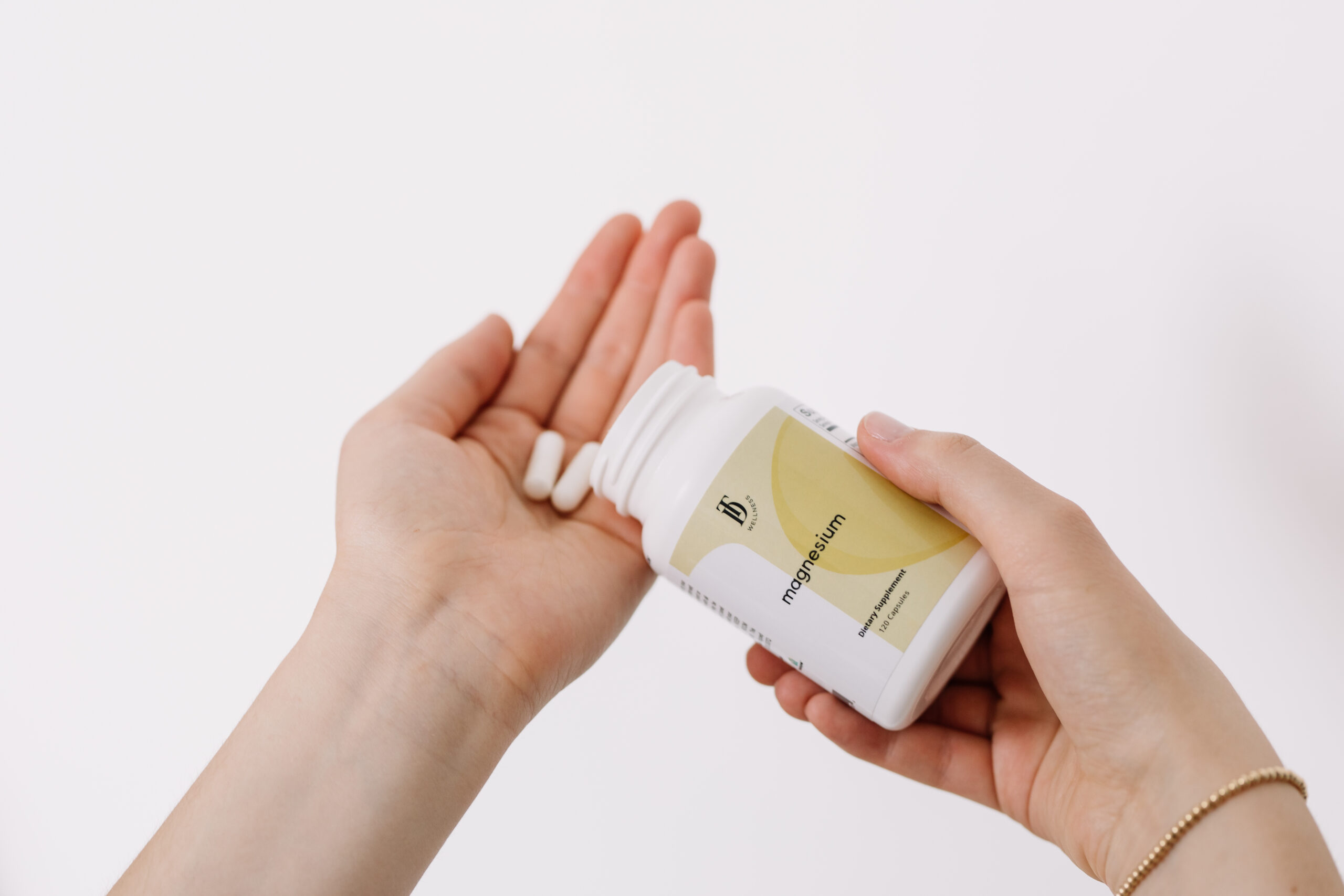How Tracking & Syncing With Your Cycle Can Help PMS

Does your period have you curled up in a ball every month, giving you excruciating period cramps? Or is your mood bouncing off the walls, having your family on eggshells?
If so, I have some eye-opening information for you today. Tracking your cycle can not only transform the way you view your menstrual cycle and symptoms but your overall health as well. Tracking your menstrual cycle can give you an insight as to if you have imbalances occurring that are contributing to your PMS and period cramps.
PMS and Menstrual Cramps are Common, But Aren’t Normal!
I can’t tell you the number of women who are surprised to learn that PMS and menstrual cramps aren’t normal. As an adolescent, it’s ingrained in us that we will bleed once a month and horrible period cramps and moodiness and maybe some acne will tag along with it. “We’ve been warned!”
But that’s not the entire story.
PMS and other symptoms that come along with your period occur when there is an imbalance in your body. The majority of women experience pain and annoying symptoms every month because the majority of women have some type of imbalance in their bodies. Whether that be nutrient deficiencies, poor detox pathways, estrogen dominance, and more, the is always a reason.
This is no surprise because the common U.S. lifestyle consists of staying up late, stressful jobs, busy lifestyles, drinking too much coffee and alcohol, eating meals that are based around conventionally raised meats and cheeses, and inadequate intake of fruits and vegetables. That’s just a recipe waiting for hormone and body imbalances.
When your hormones, like estrogen, progesterone, thyroid, cortisol, and/or testosterone, get out of balance, it can become a major contributor to your painful and just annoying symptoms.
Track Your Cycle for Clues of Imbalances
The first thing you can start doing today is to track your cycle. Tracking your cycle can not only help you prevent pregnancy and/or enhance conception success (depending on your goal), but it can also tell you a lot about your overall health. That’s why your period is becoming known as the fifth vital sign!
By tracking your cycle, you can see if your cycles are consistent, or if your follicular phase or luteal phase is too long or short. You can even keep track of the severity and timing of your PMS symptoms. These can give you clues as to what hormones are out of balance.
For example, if we see that your luteal phase is too short (under 11 days), it could be a sign of low progesterone. If you consistently have headaches around ovulation, histamine intolerance could be a possibility because of the heightened estrogen levels. These insights can be vital information to know how to properly support your PMS and period symptoms.
Plan Around Your Menstrual Cycle
Instead of being a nuisance and a thing you dread, your menstrual cycle can actually be a superpower. When you understand what your body needs and when it needs it, it can help your body get into a natural groove and act as PMS support.
Here’s what I mean… * But please keep in mind that every women’s cycle is a bit different. These are averages. That is why it’s important to track your own cycle to be more accurate.
Follicular Phase (Days 6-14)
This is the time when your estrogen is starting to rise, and you have the most energy and creative ideas flowing. This is when you can do your HIIT workouts, runs, and more intense exercises.
Ovulation (Days 14)
Estrogen peaks and your social and communication skills are at their finest. This is the time to go out with friends, plan your special dates with your significant other, and even plan your work meetings! Keep going with your high-intensity workouts here. You might also notice that this is the time of the month where you are “in the mood” or initiate sexy time with your husband.
Luteal (15-28)
During your luteal phase, your body is starting to slow down. You won’t have as much energy as you had during the follicular phase. You may feel more of a homebody. Towards the end of your cycle, is when you really should prioritize self-care and give your body a rest. Pause on the workout and do more gentle exercises like walking and stretching.
Menstruation (Days 1-5)
This is when you should really rest up and give your body the extra nutrients it needs and craves. Because you’re bleeding and losing essential nutrients, it’s important to replenish them. During menstruation, you should also take the time to relax. Intense exercises aren’t going to help your cycle. Instead, practice some gentle yoga, stretching or take an epsom salt bath.
Most women are very out of tune with their bodies and try to be on the go 24/7. They expect to be productive all the time, and this just isn’t realistic or how our body was designed to work. Just like nature, our body goes through a growing season, a harvest, and a rest season.
If you ignore this evolutionary and natural cycle and are constantly trying to overwork your body with little to no rest, your body is going to crash and your symptoms will be even worse. Listen to your body and learn more about your menstrual cycle to discover how to work with your body and not against it. Tracking your cycle can help you so that you can get an idea of if your body is balanced, what it needs and what you can do to nourish it.
With time, you’ll be able to nourish and care for your body correctly, and it won’t rebel against you.
What to Eat During Periods
Understanding how your menstrual cycle works is key to supporting it naturally to avoid PMS symptoms. Knowing which foods to eat and when to eat them is also going to be a game-changer in your long-term period health. Your diet is one of the most powerful tools you have for PMS support.
Foods for Follicular Phase
-
Artichoke
-
Carrot
-
Broccoli
-
String Beans
-
Parsley
-
Green Peas
-
Zucchini
Foods for Ovulation
-
Asparagus
-
Scallion
-
Brussels sprouts
-
Spinach
-
Chard
Foods for Luteal Phase
-
Sweet Potato
-
Cauliflower
-
Squash
-
Collard Greens
-
Onion
-
Radish
Food for Menstruation/ During Your Period
-
Beet
-
Kelp
-
Kale
-
Mushrooms
Tracking & syncing with your cycle can help PMS by identifying imbalances and can help give you a starting point to address them. Imbalanced hormones, nutrient deficiencies, or something else could be the reason why you struggle every month. But you don’t have to struggle like we’re taught to believe!
Slowing down, eating whole organic foods, practicing stress management, and helping your body throughout its natural cycle is key to getting your hormones back on track and body in balance.
A functional medicine provider can help you in your health journey to eliminate PMS symptoms and help you understand what’s going on in your body so you can incorporate simple changes into your life to see big health transformations. You can start tracking & syncing with your cycle right now to help your PMS and give your provider clues as to what’s occurring on a hormonal level.
Our approach is to truly understand your health history, current symptoms, functional lab testing, and analysis to create personalized protocols for your body. If you are already tracking your menstrual cycle, it can make it easier to find out why you are experiencing PMS and period cramps so we can address it once and for all!
Stay Updated With Exciting News at Taylor Dukes Wellness!
We are always working on new ways to serve you and your family on your health journey. Be the first to know about new offerings, health articles, and more by clicking here and filling out your information so we can be in touch.
Share This Post:
Your Wellness Deep Dive
- Be the first to learn about new healthy living resources, blog posts, and exclusive TDW offerings by getting on my insider list.
- Find healthy living products with ingredients you can trust – the same ones I personally use for myself and my family – in the TDW Shop. Check out our protein powders, electrolytes, supplements, and more!
- Get personalized support through the TDW Community. When you become a member, you get access to functional medicine expertise from me and my team, functional medicine lab testing and 1:1 consults, a digital library of exclusive wellness content, live monthly Q&As with me, and so much more!
YOU MAY ALSO LIKE:
Helping you get your gut right, improve energy, boost immunity, balance hormones, sleep better and look + feel your best
DISCLAIMER
PRIVACY POLICY
TERMS + CONDITIONS
ACCESSIBILITY
© 2025 Taylor Dukes Wellness
LEARN
SHOP
ABOUT
TDW Community
Free Guides
Blog
TDW Store
Fullscript
About Taylor
Press
Contact
COOKIE POLICY
SITE CREDIT
Trusted Products



